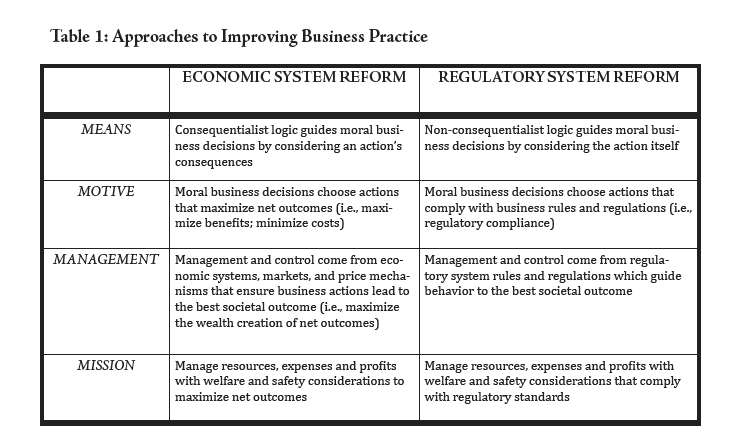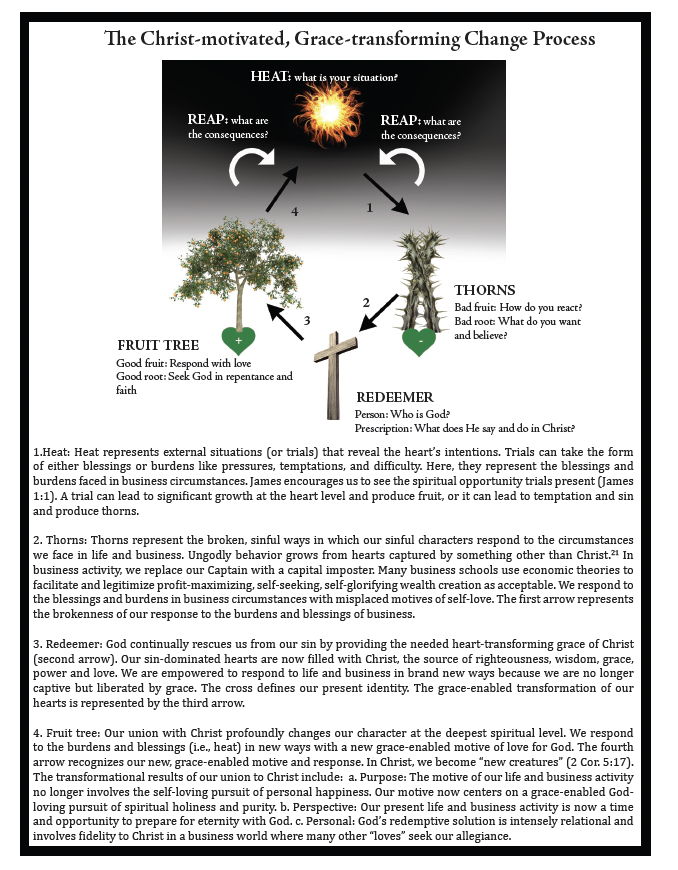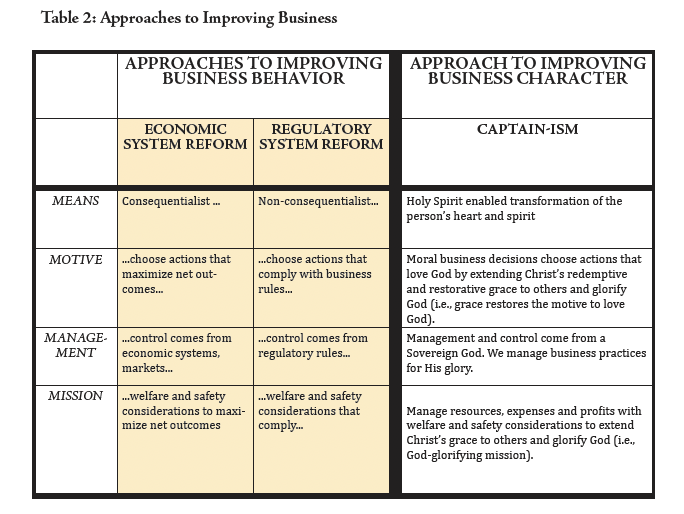
[By Marty Stuebs, 2017]
Abstract
The brokenness of business activity is deeper than a horizontal, societal problem of not following the right business rules. It involves a vertical, relational, spiritual problem of not following the right Ruler, God, that requires the spiritually redemptive and restorative work of the Trinity. Behind broken business practices are broken business people (Romans 7:14-25). This article unpacks a biblical approach to redeeming business that sees the transformation of business activity as a relational process. It begins with the vertical conversion of the human spirit by a loving God and ends in horizontal business activity and social change for the glory of God.
The Need for Redemption and Restoration
Corporate scandals reported daily in the Wall Street Journal reveal our business economy’s brokenness. In 2016, Mylan Pharmaceuticals unreasonably hiked the price of its lifesaving EpiPen allergy treatment, threatening customer welfare and safety. Wells Fargo was embroiled in a scandal where bank employees failed to protect customer financial welfare and safety by opening accounts without customer authorization. In 2015, Toshiba admitted to inflating fraudulently reported earnings over a seven-year period by $2 billion, jeopardizing the financial welfare and safety of potential investors and creditors. Volkswagen installed software on diesel-engine models to cheat on emissions tests designed to protect the welfare and safety of the environment.
These examples illustrate specific applications of a more general ethical business challenge used throughout this article: how to balance the economic management of resources, expenses, and profits with the welfare and safety of customers, employees and other constituents. In each example cited, a business unreasonably sacrificed constituents’ welfare and safety in pursuit of increased economic gain. From an economic perspective, these activities are wrong because they lead to ineffective and inefficient risks and economic outcomes. From a legal perspective, these activities are wrong because they violate informal social norms and/or formal rules and laws. From a Christian perspective, these activities are wrong because they fail to love, honor and glorify God by using His resources to extend grace and love to others for His glory. Each of these perspectives views the brokenness differently.
What then is needed to redeem this brokenness? The purpose of this essay is to recognize that redeeming and restoring business requires us to operationalize two rich realities of a Christian biblical blueprint for change: (1) an accurate diagnosis identifying the depth and severity of the brokenness of business, and (2) an adequate prescription recognizing the resulting necessity and power of the Trinity to transform the heart of business. The brokenness of business is deeper than a horizontal, societal problem of not following the right business rules and practices. It involves a vertical, relational, spiritual problem of not following the right Ruler—our God—that requires a personal, spiritually redemptive and restorative solution that only a perfect and loving Godhead can provide. This Gospel-centered approach to redeeming business most closely coincides with H. Richard Niebuhr’s conversionist approach and sees transformation of business activity as a relational process which begins with the conversion of the human spirit by a loving God and ends in business activity and social change for the glory of God.1
The Mess: How Broken is Business?
A broken behavior problem
Adequately prescribing a redemptive treatment first requires an accurate diagnosis. What is broken and in need of repair? Our society’s secular response sees the problem as a broken business behavior problem and prescribes economic and regulatory responses to improve business system incentives and rules to encourage and regulate right business activities. The Securities Acts of 1933 and 1934 were enacted after the crash of 1929 to reform the incentives and rules in our capitalist business system.2 The Sarbanes-Oxley Act of 2002 (SOX) modified the incentives and rules of business after a series of financial reporting frauds culminating with Enron and WorldCom.3 In response to the 2008 mortgage crisis and Great Recession, Congress passed the Dodd-Frank Act in 2010 to again improve and reform economic incentives and regulatory rules to improve business activities.4
After diagnosing the problem as a broken behavior problem, these approaches prescribe solutions that modify economic and regulatory systems to control, influence and reform business behavior. The use of economic system incentive reforms is guided by the logic underlying consequentialist (or teleological) moral perspectives like utilitarianism or egoism. Since consequentialist logic evaluates actions based on consequences, economic system reforms modify economic incentives and consequences to improve business actions. According to economic theory, economic incentives and market mechanisms are used as an “invisible hand” to guide and assure that individuals acting in their individual self-interests maximize society’s net outcome.5 Instead, the use of regulatory system reforms is guided by the logic underlying non-consequentialist (or deontological) perspectives like Kant’s categorical imperative. Since non-consequentialist logic views business ethics as a matter of understanding and applying certain imperatives or rules to guide actions, regulatory system reforms modify the rules governing business to improve business practice.6
The brokenness of business involves a vertical, relational, spiritual problem of not following the right Ruler—our God.
Returning to the general ethical business challenge, these economic and regulatory system reforms are intended to aid business management of resources, expenses, and profits balanced with the welfare and safety of customers, employees and others. Economic system reforms can implement penalties and disincentives to curb behaviors that threaten constituent welfare and safety. Legal reforms can implement additional regulatory and monitoring controls to limit behaviors that threaten societal welfare and safety. For example, the Sarbanes-Oxley Act of 2002 (SOX) increased the economic penalties and disincentives for corporate financial reporting frauds and established additional regulatory and monitoring mechanisms to protect the investing public. Table 1 summarizes these two approaches.

A broken character problem
The repetitious cycle of business system failure and reform indicates that improving economic and regulatory systems, while helpful, is incomplete. Changing the system to ensure right behaviors misdiagnoses the problem and leads to little more than “damage control.” It addresses symptoms but not the problem. The Bible recognizes that the change most needed is deeper than that offered by incentives and rules to improve behavior. The Law does not redeem brokenness; it reveals it.
The problem is a business character problem, not just a behavior problem, and our Great Physician prescribes a Person solution—a Ruler to change the character of businesspersons enabling them to do the right behaviors for the right Reason. Jesus confronts the rich young ruler with this deeper need when asked, “What must I do to inherit eternal life?” While the rich young ruler had followed all the right rules, Jesus’ challenge, “Go, sell everything you have…Then come, follow me” revealed that his self-seeking heart could not follow the right Ruler. In his eyes, he had solved the behavioral problem and done the right actions, but Jesus’ challenge exposed a deeper spiritual problem of the heart. His behaviors were for the wrong reasons. He wanted to use a rules-based solution as a means of self-validation and self-promotion. He was a person with a broken character. Rules alone were not enough. The disciples asked in amazement, “Who then can be saved?” Jesus revealed broken humanity’s need for a relational, Ruler-based solution, “With man this is impossible, but not with God” (Mark 10:17-27). Only a Ruler can redeem.
Economic activity—unlike anything else—tests and reveals the spiritual character and devotion of our hearts.7 Jesus recognized that no one “can serve two masters…You cannot serve both God and money” (Matthew 6:24). Our hearts are susceptible spiritually to subtly replacing love and pursuit of God, our Captain, with love and pursuit of capital. In fact, words like capitalism, captain, and capture come from the same Latin root, capit, which can be shortened to capt and means “head” or “leader.”8 Often, our wandering hearts forget God as our rightful Ruler or Captain and are captured and led by various rulers in creation—including capital.
The Bible recognizes business activity’s deeper, sacred spiritual dimension. It describes Adam’s work in the Garden of Eden with the word Avodah—meaning “work and worship”—a term used over one hundred times in the Old Testament. In our English vocabulary we use the term vocation, or calling by God, to recognize work’s sacred spiritual aspects. The New Testament also recognizes business activity’s sacred spiritual dimension when it stresses working well, as if for God (Col. 3:23-24; Eph. 6:7).9 Elevating and idealizing free-market capitalism can threaten this God-glorifying spiritual dimension.10 In “The Market as God,” Cox marvels at the degree to which business theology has replaced biblical theology resulting in an idolatry problem where pursuit of capital subverts pursuit of our Captain.11 This idolatry is not just a behavioral failure to obey God’s rules; it is a setting of the whole heart’s spiritual character and devotion on a ruler besides God.
Redeeming business requires more than identifying better incentives or rules of fair play to guide right behaviors in the business game. At a much deeper level, redeeming business involves identifying God as our best and only Ruler to guide the right spiritual character in the hearts of businesspeople.
The visible dysfunction of our economic capitalistic system is a result of the underlying spiritual dysfunction in humanity’s character. It is another example of humanity’s misuse of the fruit of creation. Will we manage creation for our Creator or will creation manage us? According to Davis and Meyer, an economy is a collection of institutions by which creation’s “resources are used to fulfill desires.”12 There are right desires and wrong desires that guide our use of creation—Spirit-seeking, God-glorifying desires and self-seeking, self-glorifying desires—as philosopher James K. A. Smith reminds us.13 Our capitalist society and economy promotes and even legitimizes self-seeking, self-glorifying business character. Economic theory uses and forwards a character of selfinterest as the primary engine driving profit-maximizing, self-seeking economic behavior.14 The self-seeking gospel of self-interest, self-satisfaction, self-sufficiency, self-determination and self-glorification is preached from the pulpits of many business school classrooms appealing to converts. Capital may look a lot like a ruler—a popular sacred end in today’s materialistic society, but it is just a tool and often a means to serve self-interest with the motive of self-love and the mission of self-glory.15 In this sense, capitalism leads hearts astray from our Captain. The result is business activity with a mission that seeks self-glory rather than God’s glory.16 This quest for self-glory began when the first humans ate the fruit attempting to claim knowledge reserved for God by decree (Gen 3:2-7). Misplaced motives of self-love and a misplaced mission of self-glory underlay the misguided behaviors in the Garden.
At Babel, humanity’s business activity was captured by a quest for self-glory.17 Like the productivity at the tower of Babel, capitalism’s liberation of the base motive of self-interest successfully can generate enormous wealth creation. However, God cares equally about wealth creation and wealth distribution.18 Returning to the earlier general ethical business challenge, the desire for wealth creation motivated by a character of self-interest may lead businesses to unreasonably sacrifice constituents’ welfare and safety in the pursuit of increased economic gain and wealth creation. Arthur Andersen’s story (described in detail in Final Accounting: Ambition, Greed and the Fall of Arthur Andersen by Barbara Ley Toffler) offers a cautionary case study of how self-seeking behaviors initially generated abundant wealth creation but rapidly led to a fall and the ultimate demise of the world’s largest public accounting firm. In the parable of the rich fool, Jesus reveals that the rich fool’s self-seeking character motivated successful economic behaviors and abundant wealth creation. Unaccompanied by God-glorifying wealth distribution, the rich fool deployed his wealth for personal comfort and self satisfaction and lost his life (Luke 12:13-21).
Redeeming business requires more than identifying better incentives or rules of fair play to guide right behaviors in the business game. At a much deeper level, redeeming business involves identifying God as our best and only Ruler to guide the right spiritual character in the hearts of businesspeople. This Ruler-facilitated redemption of our hearts redeems business actors and complements and completes the rule-facilitated changes to reform business activities
The Means: The Heart-Transforming Power of the Holy Spirit
Because broken business behavior results from broken spiritual character, God provides redemption for business in the spiritual form of a Person. God’s transformation process involves the three persons of the Trinity. The Holy Spirit is our Enabler. He enters and regenerates our hearts from self-centered to God-centered providing the heart transforming power and means for change. It takes the Holy Spirit to enable our needed heart change, and this enabled heart change produces God-glorifying fruits of the Spirit (Gal. 5:22-23).
In the middle of our business struggles, the Spirit radically transforms our hearts by His grace, so that we are able to desire and act in God-glorifying ways—performing right God-glorifying wealth creation activities for the right God-glorifying wealth distribution reasons. Leaving behind personal comfort and self-fulfillment goals, the Spirit enables us to reach for Christ, our Redeemer.19 At the center of God’s process for redeeming the heart of business is the cross of Christ. The grace of Christ does what rules and the law cannot and heals our broken hearts. God’s love enables our hearts to love Him (1 John 4:19). [See Box: The Christ-motivated, Grace-transforming Change Process20]
The Management: The Sovereignty of Captain-ism
God’s plan to redeem us and our broken business activities shows us a moral architecture where God, the Alpha and the Omega—our sovereign beginning and ultimate mission and end, motivates obedience. The sovereign good Shepherd restores us, the lost sheep (Ezek. 24:11-12). We now follow his ways out of love.22 We replace capitalism with Captain-ism. We recognize God’s authority over all of our lives, not just the spiritual domain. This includes sovereignty over our business practices. A shift from capitalism to Captain-ism provides several transforming implications:
- Business management/control: Capitalism’s brokenness is in need of restorative control to sustain functionality. As Van Duzer observed, “left to its own devices, business will fail. It simply lacks the internal mechanisms needed to keep it away from destructive excesses.”23 Captain-ism offers control that extends beyond the systemic controls of incentives, rules and regulations and even the self controls offered by personal virtue. While capitalism’s economic and regulatory systems in creation provide only imperfect and incomplete control of behavior, Captain-ism provides the sovereign control of a loving, perfect Creator to restore and manage our spiritual relationship with the Divine. Sozhenitsyn recognized the need for the Sovereign’s spiritual control and management in any business system when he said, “Untouched by the breath of God,…both capitalism and socialism are repulsive.”24
- Business role: In capitalism, human beings with money are owners of anything they buy.25 In Captain-ism, we recognize our Creator’s sovereign management and control and that He appoints us as stewards over the business use of His creation. Our business professions are vocations or callings by a sovereign God, our Manager, to serve Him as faithful business stewards—or business managers. We manage our Father’s business (Luke 2:49; Mt. 25:14-30; Lk. 19:12-27).
- Business mission: Our professional activities now profess Christ’s redeeming grace through the Holy Spirit’s enabling for the glory of God. Beyond physical activity, work becomes a spiritual act of worship. Our focus changes from glorifying self with our business success to glorifying God with our business blessings.
26 The first commandment teaches us that the list of our Captain-ism priorities narrows to one: God and His glory (cf. 1 Cor. 10:31).27 Our business purposes even extend beyond serving our neighbor and the common good. We now serve the common good as a means to serve our God. The writer of Ecclesiastes concludes that meaning and purpose for all business activity can only be found in the mission of service to God (Eccles. 12:13).
The Mission: The Beauty of My Father’s Business
The sovereignty of Captain-ism practically transforms our business mission and day-to-day business practices with others in substantive ways as we carry out our Father’s business and follow Jesus’ example. Jesus provides an example for us of a life dedicated to His Father’s business motivated by God’s love (John 3:16) and submitting to God’s sovereign will (Luke 22:42) for His glory (John 17:4). This God-loving motive and God-glorifying mission transformed the disciples and they can transform our business:
- Business perspective: Captain-ism changes our perspective to recognize the eternal spiritual dimension within our present business practices. In the parable of the shrewd manager (Luke 16:1-15), Jesus teaches us to have a God-glorifying perspective as business managers when managing and distributing wealth and resources. This God-glorifying perspective changes our business activity. First, we practically can try to see our God-given work in a God-glorifying missional light that may not otherwise be evident (Col. 3:23-24; Eph. 6:7). Second, we can try to help others in our business settings see a spiritual connection in their business activities.28
- Business priorities: Captain-ism changes how we practically set our day-to-day priorities. Jesus provides the example of submitting to the Father’s will and mission in prayer when establishing priorities (Luke 22:42). Submitting to a God-glorifying mission changes how we establish our business priorities. First, we should seek God’s authority and guidance in our lives. This explicitly recognizes that God participates in our present business activities (Mt. 28:20). As stewards, each business task is carried out in sacred trust. Second, we set our schedules and use our time under His authority and will. We are open to His interruptions, and treat the interruptions of others as opportunities, not problems.29
- Business people: Captain-ism changes how we relate to and deal with people in business. Under capitalism, we can view people as resources to generate wealth creation, and our selfish tendency is to treat relationships as avenues to self-glorification.30 However, Jesus’ example values and sacrificially serves people for God’s glory. Under Captain-ism, we participate in business activities so as not to be served by others but to serve God by serving others (Mt. 20:28, Mk. 10:45, John 13:1-17). By serving others, we are vehicles of God’s grace to others and carry out our Father’s business to the glory of God. People we work with need to feel valued and unique—treated with human dignity, recognizing the glory and dignity of God’s creation.31 Jesus provides the example of servant leadership (John 13:1-17) and called and trained his disciples to be faithful followers (Matt. 4:19). We can lead like Jesus,32 and use the principles of servant leadership and faithful followership33 to transform our business relationships and activities.
These changes equip us and transform our response to the ethical business challenge. Having received the hearttransforming grace of Christ, we are motivated to respond to the burdens and blessings of business with Spirit-enabled means to produce the fruits of God-honoring wealth creation and God-glorifying wealth distribution. Our business responsibilities extend beyond the self-interested responsibility of maximizing shareholder wealth creation. We now pursue wealth creation but within the context of managing economic resources and expenses to serve our business responsibilities to others—marketing and pricing responsibilities for customers (e.g., the Mylan Pharmaceuticals and Wells Fargo examples), manufacturing responsibilities for regulators (e.g., the Volkswagen example), and financial reporting and transparency responsibilities for investors and creditors (e.g., the Toshiba example). Our transformed relationship with God and His mission would transform our business relationships and activities with others. Table 2 summarizes the Captain-ism approach to improving business persons.
While each approach can lead to improved and ethical business decisions and practices, key differences are important to note. First, notice that the Captain-ism process for redeeming and restoring business begins and ends with a perfect God, the Alpha and the Omega. The Holy Spirit provides the means, Christ provides the motive, and the Father provides sovereign management for a business mission that glorifies God. Grace-enabled means lead to God-glorifying ends. The traditional approaches to improving business practice rely on imperfect economic and regulatory systems. Second, notice that the motives—the reasons for business decisions—are different. The approaches to improving business practice rely on the incomplete motives of maximizing economic outcomes and legal compliance. Even if these motives achieve better societal outcomes from business practice and lead to the common good, they are incomplete. Captain-ism is motivated by the love of God through restorative grace to achieve the glory of God, the ultimate and complete end. These differences highlight that the Captain-ism approach to business is enabled by God for the glory of God and, as a result, is spiritually sustainable.
Conclusions
Traditional approaches to redeeming and restoring business rely on economic and regulatory system reforms to improve business practice. These approaches offer incomplete solutions because they diagnose the problem as a behavioral problem. As a result, these solutions suffer from two limitations: misplaced confidence and misplaced worship. These solutions place confidence in mechanisms of imperfect creation—economic market systems and regulatory systems—instead of the methods of a perfect Creator. These solutions misplace worship and prioritize ends in creation like the glory and good of self or even the glory and good of others or society or the common good instead of worshipping the Creator with business for God’s glory.
The Bible recognizes that the brokenness of business is deeper than a behavioral problem; it is a spiritual problem of the heart. As a result: Who can redeem business? Christ alone. Who can restore peace in business? Christ alone. Who can produce contentment and joy in business? Christ alone, who is the Word of all creation and life (see John 1:1-3, 1 John 1:1). Restoring this needed spiritual foundation to our business activities through the work of the Trinity can redeem business and rightly restore confidence and worship. Although business occurs in an imperfect world with imperfect people, it is managed by a perfect God for His glory. Paul’s prayer in Philippians recognizes the heart-transforming, redemptive work of the Trinity and provides a fitting prayerful conclusion to these thoughts.
“And this is my prayer: that your love may abound more and more in knowledge and depth of insight [i.e., proper recognition of our heart’s Ruler and true love], so that you may be able to discern what is best [i.e., influences business decisions and practice] and may be pure and blameless until the day of Christ, filled with the fruit of righteousness [i.e., The Means: enabled by the Holy Spirit] that comes through Jesus Christ [i.e., The Motive: redeemed by Christ’s grace] —to the glory and praise of God [i.e., The Management: business serving our Creator Captain]” (Philippians 1:9-11)
Notes
1 Richard Niebuhr, Christ and Culture (Harper & Row, New York, 1951). Louke van Wensveen Siker, “Christ and Business: A Typology for Christian Business Ethics,” Journal of Business Ethics (1989, 8(11), 883-88).
2 For more detail see: https://en.wikipedia.org/wiki/Securities_ Act_of_1933 and https://en.wikipedia.org/wiki/Securities_ Exchange_Act_of_1934.
3 For more detail see: https://en.wikipedia.org/wiki/ Sarbanes%E2%80%93Oxley_Act.
4 For more detail see: https://en.wikipedia.org/wiki/ Dodd%E2%80%93Frank_Wall_Street_Reform_and_Consumer_ Protection_Act.
5 See L. T. Hosmer, “Managerial Ethics and Microeconomic Theory,” Journal of Business Ethics (3/4, 1984), 315–325.
6 The underlying legal theory assumption is that the law contains and expresses society’s collective moral standards. For more discussion see L. T. Hosmer, The Ethics of Management, 6th ed., (New York, NY: McGraw-Hill, 2008).
7The bible offers more than 2,000 verses on money and possessions. Sixteen of Jesus’ thirty-eight parables involve money, possessions and economic activity. For more detail see: http://www.preachingtoday.com/illustrations/1996/december/ 410.html.
8 http://www.merriam-webster.com/dictionary/captain
9 Hallqvist Albertson, “Christian Leaders on Faith and Work,” Christian Business Review (5, 2016), 40-48. 10 Tim Wienhold, “Old God, New Garb,” Christian Business Review (5, 2016), 33-39.
11 Harvey Cox, “The Market as God,” The Atlantic (March 1999); accessed at http://www.theatlantic.com/magazine/archive/ 1999/03/the-market-as-god/306397/.
12Stan Davis and Christopher Meyer, Blur: The Speed of Change in the Connected Economy (New York: Grand Central Publishing, 1999).
13James K. A. Smith, Desiring the Kingdom: Worship, Worldview and Cultural Formation (Cultural Liturgies) (Grand Rapids, MI: Baker Academic, 2009).
14 Milton Friedman, “The Social Responsibility of Business is to Increase its Profits,” The New York Times Magazine (September 13, 1970); and Michael C. Jensen and William H. Meckling, “Theory of the firm: Managerial behavior, agency costs and ownership structure,” Journal of Financial Economics (3:4, 1976), 305-360.
15 David W. Gill and Albert M. Erisman, “The First Word on Business,” Christian Business Review (5, 2016), 22-32.
16 Richard J. Martinez, “From the Image of God to ‘We are god’: Babel Revisited,” Christian Business Review (5, 2016), 49-58.
17 Ibid., 51.
18 Wienhold, 33-39.
19 Timothy S. Lane and Paul David Tripp, “How Christ Changes Us by His Grace,” Journal of Biblical Counseling (Spring 2005), 15-21.
20Adapted from Lane & Tripp.
21 Ibid., 19.
22 Gill & Erisman, 25.
23 Jeff Van Duzer, Why Business Matters to God (Downers Grove, IL: InterVarsity Press, 2010), 166. 24 Alexsandr Solzhenitsyn, in an interview with Joseph Pearce, Sr. in St. Austin Review (February, 2003) at http://www. catholiceducation.org/en/culture/art/an-interview-with-alexander- solzhenitsyn.html
25 Wienhold, 36.
26 Kyle Idleman, “Idol ID,” Christian Business Review (5, 2016), 11.
27 Gill & Erisman, 24.
28 Ibid.,
29. 29 Ibid., 25.
30 Martinez, 51.
31 Gill & Erisman, 30.
32 For more information on servant leadership see Ken Blanchard and Phil Hodges, Lead Like Jesus (Nashville, TN: W Publishing Group, 2005).
33 For more on the concepts and principles of followership in business see the following resources: R. E. Riggio, I. Chaleff and J. Blumen-Lipman, The Art of Followership: How Great Followers Create Great Leaders and Organizations (San Francisco, CA: Jossey-Bass, 2008), and S. D. Baker, “Followership: The theoretical foundation of a contemporary construct,” Journal of Leadership & Organizational Studies (14, 2007), 50-60.
About the Author
 Martin Stuebs, Jr. is Associate Professor and the R. E. and Marilyn Reamer Professor in Accounting at Baylor University. He has taught a number of accounting ethics and managerial accounting courses. His research interests include topics that span accounting ethics and professionalism. His work, which includes several awardwinning cases in accounting ethics and articles in accounting practice, has been published in Journal of Business Ethics, Journal of Accounting and Public Policy, Accounting and the Public Interest, Journal of Information Systems, Strategic Finance, Issues in Accounting Education, Journal of Accounting Education, and a number of other journals. Martin holds a Bachelor’s of Business Administration (BBA) in Accounting and a Masters of Accountancy from the University of Wisconsin and a Ph.D. in Accounting from the University of Arkansas.
Martin Stuebs, Jr. is Associate Professor and the R. E. and Marilyn Reamer Professor in Accounting at Baylor University. He has taught a number of accounting ethics and managerial accounting courses. His research interests include topics that span accounting ethics and professionalism. His work, which includes several awardwinning cases in accounting ethics and articles in accounting practice, has been published in Journal of Business Ethics, Journal of Accounting and Public Policy, Accounting and the Public Interest, Journal of Information Systems, Strategic Finance, Issues in Accounting Education, Journal of Accounting Education, and a number of other journals. Martin holds a Bachelor’s of Business Administration (BBA) in Accounting and a Masters of Accountancy from the University of Wisconsin and a Ph.D. in Accounting from the University of Arkansas.









